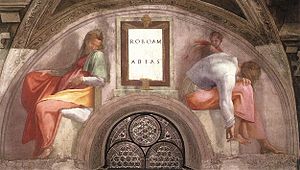- Matthew 1:7
-
 Michelangelo's Rehoboam - Abijah.
Michelangelo's Rehoboam - Abijah.
Matthew 1:7 is the seventh verse of the first chapter of the Gospel of Matthew in the New Testament. The verse is part of the section where the genealogy of Joseph, the legal father of Jesus, is listed.
In the King James Version of the Bible the text reads:
- And Solomon begat Roboam;
- and Roboam begat Abia;
- and Abia begat Asa;
The World English Bible translates the passage as:
- Solomon became the father of Rehoboam.
- Rehoboam became the father of Abijah.
- Abijah became the father of Asa.
For a collection of other versions see BibRef Matthew 1:7
This part of the list coincides with the list of the Kings of Judah that is present in a number of other parts of the Bible. Unlike other parts of Matthew's genealogy this list is fully in keeping with the other sources. The first listed is King Solomon of Israel who is said to have reigned c.962 BC to c.922 BC. The genealogy then follows that of the kings of Judah beginning with Rehoboam whose reign W.F. Albright dates from 922 BC to 915 BC. Rehoboam's son Abijah ruled from his father's death for two years and his son Asa of Judah ruled from 913 BC to 873 BC. Rehoboam is most noted for presiding over the breakup of his kingdom and a civil war between the tribes of Israel. His son Asia had a brief and unsuccessful reign. Asa's long reign was more successful.[1]
Gundry notes that the author of Matthew adds a "φ" to Asa's name. Gundry believes this is an attempt to link the king to Asaph, to whom Psalm 78 is attributed. Psalm 78 contains important messianic prophecies.[2] Brown, and most other scholars feel this is more likely an error than a scheme and most translators of the Bible "correct" Matthew in this verse. Who made the error is uncertain. The author of Matthew could have been working from an incorrect source, he could have made the error himself, or an early copier of the Gospel could have added the letter.[3]
References
- ^ Albright, W.F. and C.S. Mann. "Matthew." The Anchor Bible Series. New York: Doubleday & Company, 1971.
- ^ Gundry, Robert H. Matthew a Commentary on his Literary and Theological Art. Grand Rapids: William B. Eerdmans Publishing Company, 1982.
- ^ Brown, Raymond E. The Birth of the Messiah: A Commentary on the Infancy Narratives in Matthew and Luke. London: G. Chapman, 1977.
Gospel of Matthew Preceded by:
Matthew 1:6Chapter 1 Followed by:
Matthew 1:8Categories:- Gospel of Matthew verses
Wikimedia Foundation. 2010.
